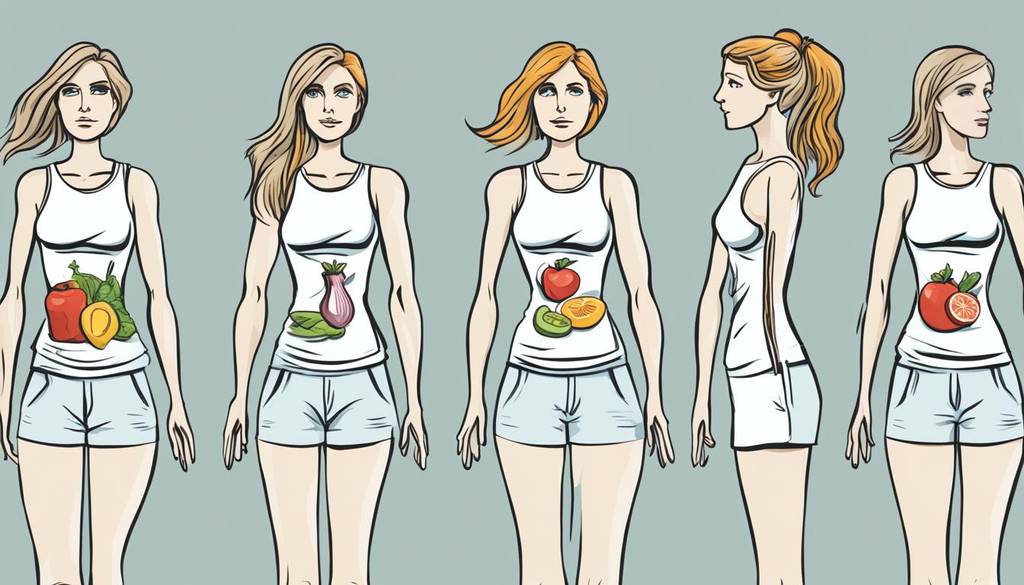Anorexia nervosa is a devastating eating disorder that affects millions of individuals worldwide. Did you know that an estimated 0.9% to 4% of women will experience anorexia at some point in their lives?
This alarming statistic highlights the scale and impact of anorexia nervosa, making it crucial to gain a deeper understanding of this complex disorder. In this article, we will explore the symptoms, causes, and treatment options for anorexia, shedding light on this often misunderstood condition.
Whether you or a loved one are personally affected by anorexia or you simply want to learn more about this prevalent eating disorder, this article will provide valuable insights to help you navigate the intricacies of anorexia nervosa.
Key Takeaways:
- Anorexia nervosa affects a significant percentage of the population, particularly women.
- Understanding the symptoms, causes, and treatment options for anorexia is crucial for early identification and support.
- Anorexia is a complex disorder that requires a comprehensive approach for effective treatment and long-term recovery.
- Raising awareness and providing education about anorexia can help reduce the stigma and encourage early intervention.
- Support systems, both professional and personal, play a vital role in the journey to recovery from anorexia.
Personal Struggles Leading to Anorexia Nervosa
Many individuals with anorexia nervosa face personal struggles that contribute to the development of the disorder. These struggles often arise from issues such as low self-esteem, body image concerns, and a need for control. When combined, these personal challenges can create a perfect storm for the development of anorexia.
Low self-esteem can manifest as a deep-rooted belief of not being good enough or worthy of love and acceptance. Individuals may internalize negative thoughts and feelings about themselves, leading to a distorted perception of their own value and worth. Body image concerns play a significant role in anorexia as individuals may have an unrealistic and negative perception of their physical appearance. They may strive for an idealized, thin body that is often promoted in society.
The need for control can also contribute to the development of anorexia. Controlling one’s food intake and body weight can create a sense of stability and power in a world that may otherwise feel chaotic or overwhelming. For some, restricting food becomes a coping mechanism, allowing them to feel in control of their bodies and lives.
These personal struggles, combined with other factors such as societal pressures and genetic predisposition, can lead to the development of anorexia nervosa. Understanding these underlying struggles is essential for effective treatment and support for individuals affected by this eating disorder.
The Psychology Behind Anorexia Nervosa
The psychology of anorexia nervosa is complex, influenced by various factors that contribute to the development and maintenance of the disorder. Understanding these psychological aspects is crucial for effective treatment and support. In this section, we will explore two key psychological aspects of anorexia: the fear of judgment and the desire for perfection.
Fearing Judgment and the Desire for Perfection
Individuals with anorexia often experience an intense fear of judgment from others, particularly regarding their body shape, weight, and eating habits. This fear stems from a deeply ingrained belief that their self-worth is directly linked to their appearance. The pursuit of unattainable perfection becomes their singular focus, leading to an obsession with achieving and maintaining an extremely low body weight.
This constant fear of judgment and the desire for perfection can drive individuals with anorexia to engage in restrictive eating behaviors, excessive exercise, and other harmful practices to attain their ideal body image. The pursuit of perfection becomes a way to cope with their underlying insecurities and gain a sense of control over their lives.
Challenges in Accepting Positive Feedback
In addition to fearing judgment, individuals with anorexia often struggle with accepting positive feedback. They may have difficulty believing or internalizing compliments or praise about their appearance or achievements. This challenge arises from their distorted perception of themselves and their deep-seated belief that they are never “good enough.”
The desire for perfection fuels a constant strive for self-improvement and self-criticism. Positive feedback can be seen as a threat to their pursuit of perfection because it challenges their perception of inadequacy and the need to constantly strive for more. As a result, individuals with anorexia often dismiss or downplay positive feedback and may even feel uncomfortable or anxious when receiving it.
Their difficulties in accepting positive feedback further reinforce their negative self-image and contribute to the cycle of disordered eating behaviors and low self-esteem.

Overall, the psychology behind anorexia nervosa is characterized by the fear of judgment and the relentless pursuit of perfection. Understanding these psychological aspects is essential for developing effective treatment approaches that address the underlying causes and challenges faced by individuals with anorexia.
Identifying the Signs of Anorexia
Identifying the signs of anorexia is crucial for early intervention and treatment. Recognizing these signs and symptoms can help individuals, their loved ones, and healthcare professionals take the necessary steps to provide support and help individuals on their journey to recovery.
Anorexia nervosa is characterized by both physical signs and behavioral changes. While each person may experience anorexia differently, there are common indicators to be aware of:
- Extreme weight loss: Significant and rapid weight loss is a common physical sign of anorexia. Individuals may display a severely low body weight that is not within a healthy range for their age and height.
- Obsessive calorie counting: People with anorexia often obsessively count calories and meticulously control their food intake. They may meticulously track the number of calories consumed and restrict their diet to an unhealthy extent.
- Restrictive eating patterns: Anorexia is marked by restrictive eating patterns, such as severe limitations on the types and amounts of food consumed. Individuals may avoid entire food groups or severely restrict their caloric intake.
- Intense fear of weight gain: Individuals with anorexia experience an overwhelming fear of gaining weight or becoming overweight. This fear drives their behaviors and choices around food and can be a significant factor in their restrictive eating patterns.
- Distorted body image: Anorexia is associated with a distorted body image, wherein individuals perceive themselves as overweight or larger than they actually are. This distorted perception can contribute to their desire to restrict their food intake further.
- Avoiding social situations involving food: Individuals with anorexia may withdraw from social events and situations that involve food. They may make excuses to avoid meals or eat in isolation to exert more control over their eating habits.
- Excessive exercise: Anorexia is often accompanied by compulsive and excessive exercise regimens. Individuals may engage in intense physical activity as a means to burn calories or compensate for their food intake.
If you or someone you know is displaying these signs and symptoms of anorexia, it is important to seek professional help as soon as possible. Early intervention can make a significant difference in the recovery process.
Next, we will explore the unique challenges faced by individuals with anorexia and the physical effects of this eating disorder. Understanding these aspects can provide valuable insights into the complexity of anorexia nervosa and the importance of comprehensive treatment strategies.
“Identifying the signs and symptoms of anorexia is crucial for early intervention and treatment.”
Anorexia Nervosa: The Eating Disorder
Anorexia nervosa is a specific type of eating disorder characterized by the severe restriction of food intake. Individuals with anorexia have a distorted perception of their body image and an intense fear of gaining weight. This section will explore the characteristics of anorexia and the detrimental effects it can have on the body.
“Anorexia nervosa is not a lifestyle choice, but a serious mental health condition that requires professional help and support.”
The severe restriction of food intake in anorexia can lead to a range of physical and psychological consequences. On a physical level, the body is deprived of essential nutrients, leading to malnutrition, electrolyte imbalances, and organ damage. As a result, individuals with anorexia may experience fatigue, dizziness, hair loss, brittle nails, and delayed or irregular menstrual cycles.
The physical effects of anorexia can also manifest in the form of weakened bones (osteoporosis), muscle loss, and a weakened immune system. These health consequences can have long-term effects on the individual’s overall well-being and quality of life.
It is important to recognize that anorexia nervosa is not solely about food and weight. It is a complex mental health disorder that requires a multidimensional approach to treatment, addressing the underlying psychological factors alongside the physical effects. If left untreated, anorexia can be life-threatening. Early intervention and professional support are crucial for recovery.
| Physical Effects of Anorexia | Psychological Effects of Anorexia |
|---|---|
|
|
Complex Relationship Between Anxiety and Anorexia
The Role of Anxiety in Eating Disorders
Anxiety often plays a significant role in the development and maintenance of anorexia nervosa. Individuals with anorexia commonly experience high levels of anxiety, driven by a variety of factors such as fear of gaining weight, body image concerns, and the need for control.
Anxiety disorders, including generalized anxiety disorder, obsessive-compulsive disorder, and social anxiety disorder, frequently co-occur with anorexia. These disorders can exacerbate the symptoms of anorexia and complicate the recovery process.
In this table, we outline the most common anxiety disorders that co-occur with anorexia nervosa. It provides insights into the prevalence of these disorders among individuals with anorexia and highlights the importance of addressing anxiety as part of a comprehensive treatment approach.
Understanding Coping Mechanisms
To manage their anxiety, individuals with anorexia may develop various coping mechanisms. These coping strategies serve as ways to control anxiety, relieve distress, and maintain a sense of security.
Some common coping mechanisms include:
- Strict control over food intake and weight
- Excessive exercise
- Perfectionism and rigid adherence to rules
- Avoidance of situations that trigger anxiety
- Self-harm or substance abuse
These coping mechanisms, while initially providing a sense of relief, perpetuate the cycle of anxiety and anorexic behaviors. It is essential for individuals with anorexia to learn healthier coping strategies that address their underlying anxiety and promote overall well-being.
By addressing both anxiety and anorexia in treatment, individuals can develop effective coping mechanisms and achieve lasting recovery.
The Journey to Anorexia Recovery
The journey to anorexia recovery can be challenging but also rewarding. If you or a loved one is on the path to recovery, it’s important to understand the treatment process and the different stages you may go through. Recovery from anorexia is a comprehensive journey that addresses the physical, psychological, and emotional aspects of the disorder.
The treatment process for anorexia often begins with medical stabilization. This involves managing any physical complications and restoring a healthy weight. Medical professionals, such as doctors and dietitians, play a crucial role in providing guidance and support during this stage.
Next, therapy is a vital component of anorexia recovery. Psychotherapy, such as cognitive-behavioral therapy (CBT) or dialectical behavior therapy (DBT), can help address the underlying thoughts, beliefs, and behaviors associated with anorexia. These therapeutic approaches aim to promote a healthy body image, build coping skills, and develop a positive relationship with food.
Group therapy and support groups can provide individuals with anorexia a sense of community and understanding. Being able to connect with others who have had similar experiences can be immensely helpful and reassuring during recovery.
In addition to therapy, nutritional counseling is an essential aspect of anorexia recovery. Registered dietitians work closely with individuals to create personalized meal plans that meet their nutritional needs while challenging disordered eating patterns.
Throughout the recovery journey, it’s important to have a strong support system. Family and friends can provide invaluable encouragement, understanding, and love. They can also help create a supportive environment that promotes healthy habits and positive body image.
Recovery from anorexia is not a linear process. There may be setbacks along the way, but with perseverance and the right support, it is possible to overcome this challenging disorder and lead a fulfilling life. Remember, every step forward, no matter how small, is a step towards healing and recovery.
Lifesaving Anorexia Support Systems
Having a strong support system is crucial for individuals with anorexia nervosa. Anorexia support systems provide the necessary emotional, psychological, and practical assistance needed for recovery. The journey to overcoming anorexia can be challenging, but with the right support, individuals can find hope and healing.
There are various support systems available that can significantly contribute to the recovery process:
- Family Support: Family support plays a vital role in helping individuals with anorexia. This support can involve creating a nurturing and understanding environment at home, educating family members about the disorder, and actively participating in the recovery journey. Encouraging open communication, fostering empathy, and implementing healthy boundaries can help create an empowering support system.
- Peer Support: Peer support is invaluable in anorexia recovery. Connecting with others who have gone through similar experiences can provide a sense of understanding, validation, and encouragement. Peer support networks, group therapy, and online communities offer opportunities to share struggles, exchange coping strategies, and celebrate milestones together.
- Professional Support: Seeking professional help is essential for effective anorexia recovery. Treatment teams may include therapists, dietitians, medical professionals, support group leaders, and other specialists experienced in eating disorder treatment. These professionals provide personalized guidance, therapy, and evidence-based interventions tailored to the unique needs of each individual.
Creating a supportive environment is crucial for individuals in recovery from anorexia. It involves fostering empathy, understanding, and patience, and avoiding judgment or stigmatization. Through anorexia support systems, individuals can find the strength and encouragement necessary to navigate the challenges of recovery and build a healthier relationship with food, body image, and self-esteem.
Note: The image above represents the importance of anorexia support systems in the recovery journey.
The Role of Therapy in Treating Anorexia
Therapy plays a vital role in the treatment of anorexia nervosa. Different therapeutic approaches are utilized to address the complex nature of this eating disorder. Psychotherapy, cognitive-behavioral therapy (CBT), and family therapy are among the effective treatment options for anorexia.
Psychotherapy focuses on exploring the underlying psychological factors contributing to anorexia and developing healthier thought patterns and coping mechanisms. CBT, on the other hand, aims to identify and challenge negative thoughts and behaviors associated with anorexia, gradually replacing them with positive and adaptive alternatives. It helps individuals develop a more balanced perspective of their body image and food-related concerns.
Family therapy involves the participation of family members in the treatment process. It recognizes the significant influence of family dynamics on an individual’s recovery journey. By fostering open communication, understanding, and support within the family unit, family therapy strengthens the overall recovery process.
It’s important to note that each individual’s journey with anorexia is unique. Therefore, treatment plans must be tailored to meet their specific needs. The use of a combination of therapies and the integration of other interventions, such as nutritional counseling and medication when necessary, may further enhance the effectiveness of treatment.
Overall, therapy provides individuals with anorexia the tools and support they need to address the underlying factors contributing to their disorder, develop healthier behaviors and relationships with food, and ultimately achieve sustainable recovery.

Understanding the Causes of Anorexia
Anorexia nervosa is a complex eating disorder with various underlying causes. It is important to explore the internal and external factors that contribute to the development of this disorder in order to better understand it.
Exploring Internal and External Factors
There are both internal and external factors that can increase the risk of developing anorexia nervosa. Internal factors include genetic predisposition, personality traits, and psychological factors. Individuals with a family history of eating disorders may be more susceptible to anorexia. Personality traits such as perfectionism and low self-esteem can also play a role in the development of the disorder. Moreover, certain psychological factors, such as body dissatisfaction and negative body image, can contribute to the onset of anorexia.
External factors, on the other hand, encompass environmental influences and societal pressures. Environmental factors can include dieting behaviors, social pressures to be thin, and traumatic events. Unrealistic body image ideals portrayed in the media and societal emphasis on thinness can significantly impact an individual’s perception of their own body and contribute to the development of anorexia.
The Impact of Societal Pressures
Societal pressures, particularly related to body image, can have a profound impact on individuals at risk of or already experiencing anorexia nervosa. The constant exposure to images of thinness and the cultural emphasis on a certain body type can foster unrealistic beauty standards. This, in turn, can exacerbate body dissatisfaction and fuel the desire for extreme weight loss.
It is important to recognize that anorexia nervosa is not solely caused by societal pressures, as it is a complex disorder with multiple contributing factors. However, addressing and challenging societal norms and promoting body positivity can play a crucial role in preventing the development of anorexia and supporting individuals on their recovery journey.
The image above visually represents the various factors that contribute to the development of anorexia. By understanding these causes, we can work towards greater awareness, prevention, and support for individuals affected by this eating disorder.
The Importance of Anorexia Awareness and Education
Raising awareness and providing education about anorexia is crucial for early intervention and support. Understanding the signs, symptoms, and available resources for help is essential in promoting the well-being of individuals affected by this eating disorder.
Anorexia awareness helps to dismantle stigmas surrounding this mental health condition and encourages open conversations about body image, self-esteem, and societal pressures. By increasing awareness, we can foster a supportive environment that promotes empathy, understanding, and timely intervention.
Eating disorder education plays a vital role in equipping individuals, families, and communities with the knowledge and tools needed to recognize the warning signs of anorexia and take appropriate action. Education empowers individuals to seek help for themselves or their loved ones, facilitating early intervention and improving the chances of successful treatment and recovery.
Early intervention is crucial in addressing anorexia. By recognizing the signs early on, individuals can receive the necessary support and resources, leading to healthier outcomes. Increased awareness and education can also help prevent the development of anorexia by promoting body positivity, media literacy, and positive self-esteem.
“Knowledge is power. By raising anorexia awareness and providing education, we can empower individuals to take control of their mental health and seek help when needed.”
Finding Strength in Anorexia Recovery Stories
Hearing and sharing personal stories of anorexia recovery can be a powerful source of inspiration and hope. Real-life recovery stories highlight the strength and resilience of individuals who have overcome anorexia, providing valuable insights into the challenges faced and the strategies used to achieve and maintain recovery.
Seeing others who have successfully navigated their recovery journey can inspire individuals currently battling anorexia to persevere and seek help. Personal narratives offer a glimpse into the emotions, obstacles, and triumphs experienced along the path to recovery, creating a sense of camaraderie and understanding.
These inspiring journeys serve as a reminder that recovery from anorexia is possible and that each individual’s path to healing is unique. By sharing their stories, those who have conquered anorexia offer hope and encouragement to others who are still struggling, showing them that they are not alone in their journey.
Through personal narratives, individuals can gain valuable insights and learn coping mechanisms from those who have already walked the path of anorexia recovery. They can discover strategies that have proven effective for others, providing potential tools to incorporate into their own recovery process.
Interpreting Anorexia Symptoms and Signals
Understanding and interpreting the various symptoms and signals of anorexia is essential for timely intervention and support. Anorexia nervosa manifests in a variety of ways, encompassing physical, behavioral, and cognitive aspects. Recognizing these manifestations can help in identifying individuals who may be struggling with anorexia and providing them with the necessary assistance.
Physical Signs and Behavioral Changes
Physical signs of anorexia can be apparent and may include:
- Severe weight loss
- Frail or emaciated appearance
- Low energy levels and fatigue
- Changes in menstrual cycles
- Dizziness or fainting spells
Behavioral changes associated with anorexia may include:
- Extreme dieting and food restriction
- Obsessive calorie counting or food rituals
- Avoidance of social gatherings involving food
- Compulsive exercising
- Heightened anxiety around mealtimes

Cognitive Patterns Associated with Anorexia
The cognitive patterns associated with anorexia are characterized by distorted thoughts and beliefs about body image, food, and weight. These cognitive patterns often reinforce the behaviors and fuel the maintenance of the disorder. Some common cognitive patterns among individuals with anorexia include:
- Extreme fear of gaining weight
- Perfectionism and a strong desire for control
- Negative body image and dissatisfaction
- Preoccupation with food, calories, and weight
- Denial and resistance to acknowledging the severity of the disorder
By recognizing these cognitive patterns, loved ones and healthcare professionals can better understand the internal struggles faced by individuals with anorexia and provide targeted support and intervention.
Being aware of the physical signs, behavioral changes, and cognitive patterns associated with anorexia is crucial for promoting early intervention and facilitating the recovery process. The next section will explore effective treatment options for anorexia, providing insights into evidence-based approaches and the multidisciplinary nature of recovery.
Effective Treatment for Anorexia
When it comes to treating anorexia, an evidence-based and multidisciplinary approach is crucial for achieving positive outcomes. This comprehensive approach addresses the physical, psychological, and emotional aspects of the disorder, recognizing that successful treatment requires a holistic understanding of an individual’s needs.
One key component of anorexia treatment is nutritional therapy, which focuses on restoring a healthy relationship with food and promoting physical well-being. Nutritionists and dietitians work closely with individuals to develop personalized meal plans that meet their nutritional needs. This includes gradual weight restoration and the establishment of regular eating patterns.
Psychotherapy also plays a vital role in anorexia treatment. Therapists, specializing in eating disorders, help individuals explore the underlying psychological factors contributing to their disorder. Cognitive-behavioral therapy (CBT) is a commonly used approach that helps individuals recognize and challenge distorted thoughts and beliefs related to body image, weight, and food. This therapy also teaches individuals healthier coping strategies and more adaptive ways of thinking.
“Effective treatment for anorexia involves a comprehensive and multidisciplinary approach.”
In some cases, medication may be prescribed to manage co-occurring conditions such as depression, anxiety, or obsessive-compulsive disorder. However, medication should always be used in conjunction with psychotherapy and nutritional therapy, as it is not a standalone treatment for anorexia.
Individualized treatment plans are essential in addressing the unique needs of each individual. What works for one person may not work for another, so it is crucial to tailor treatment approaches based on specific circumstances and challenges. Ongoing support, both during and after treatment, is also fundamental in ensuring sustainable recovery.
Prevention Strategies for Anorexia
Reducing the incidence of anorexia requires effective prevention strategies. By promoting body positivity, fostering media literacy, and implementing early intervention programs, we can create a supportive environment that encourages a healthy body image and self-esteem.
One key prevention approach is promoting body positivity. Encouraging individuals to embrace and celebrate their bodies, regardless of shape or size, can help counteract negative body image beliefs. By challenging societal ideals of beauty and emphasizing self-acceptance, we can minimize the risk of developing anorexia.
Fostering media literacy is another essential strategy. Providing individuals with the skills to critically analyze media messages about body image and beauty standards can help them develop a more realistic perception of themselves. By understanding that media often portrays an unrealistic and narrow definition of beauty, individuals can resist internalizing harmful beliefs and behaviors.
Early intervention programs play a crucial role in preventing the progression of anorexia. By identifying individuals at risk and providing timely support and resources, we can intervene before the disorder takes hold. Educating healthcare professionals, educators, and parents about the early warning signs of anorexia and the importance of seeking help can lead to early detection and intervention.
Prevention strategies for anorexia require a comprehensive and multi-faceted approach. By promoting body positivity, fostering media literacy, and implementing early intervention programs, we can create a society that supports and prioritizes mental health and well-being.
Remember, prevention is always better than intervention when it comes to anorexia. By promoting healthy body image, media literacy, and early intervention, we can help individuals build resilience and maintain a positive relationship with their bodies.
Conclusion
In conclusion, it is crucial to understand the complexities of anorexia nervosa. By increasing our awareness and knowledge of this eating disorder, we can play a vital role in early identification, intervention, and support.
Throughout this article, we have explored the key takeaways related to anorexia. One of the essential aspects is the significance of anorexia awareness. By educating ourselves and others about the signs, symptoms, and impact of anorexia, we can contribute to creating a more supportive environment for those affected.
Support systems are another crucial factor in addressing anorexia. Building a strong network of family, friends, and professionals can provide the necessary emotional and practical support. It is essential to understand the importance of accessible resources like helplines, support groups, and treatment programs that cater specifically to anorexia.
To sum up, let us continue spreading awareness about anorexia and the importance of early intervention. Together, we can make a difference in the lives of individuals affected by anorexia, providing the support and resources they need on their journey towards recovery.




